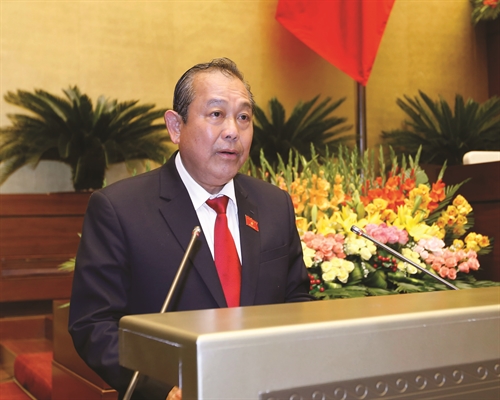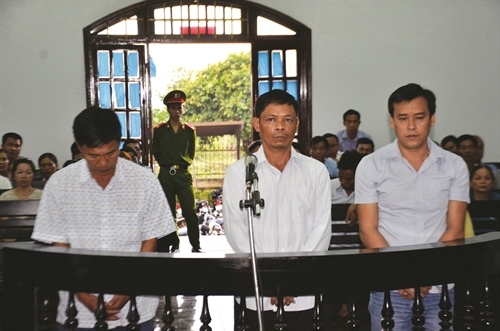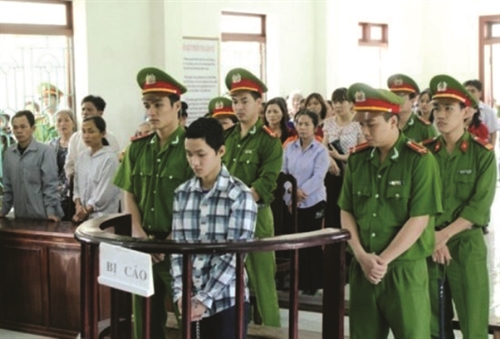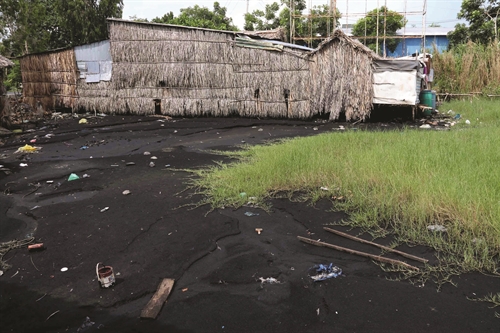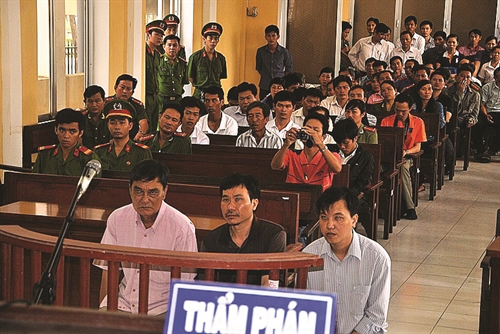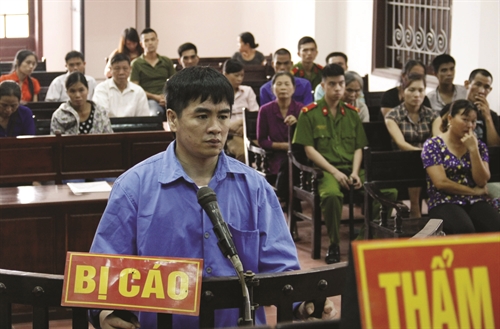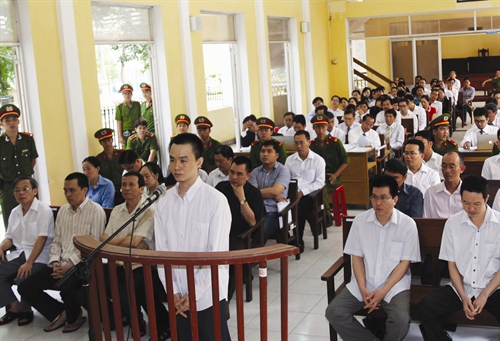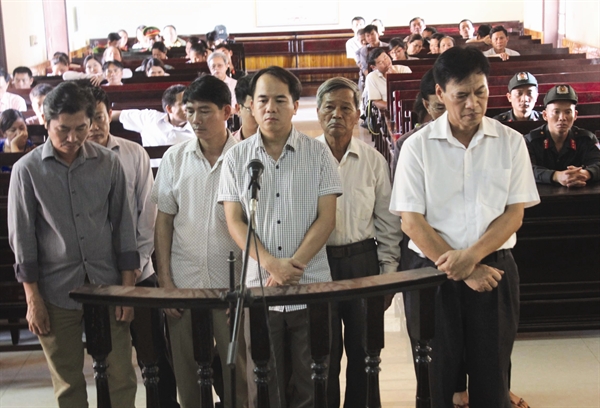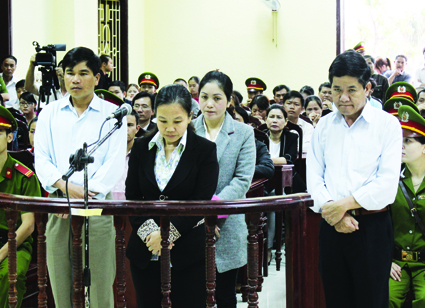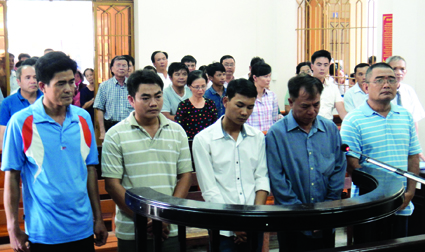>>Economic crimes in new Penal Code
>>Criminal liability of juvenile offenders under new Penal Code
>>Penal liability of legal entities under revised Penal Code: an initial analysis
Nguyen Cong Long
National Assembly Office
Further reduction of the death penalty is one of the focuses of Vietnam’s judicial reform and legal system improvement. In this spirit, in the 2015 Penal Code (the Code), which will become effective July this year, the reduction of the death penalty is demonstrated in three aspects: (i) abolition of the death penalty for many offenses; (ii) introduction of stricter conditions for death penalty application; and (iii) addition of cases in which the death penalty is not executed.
Abolition of the death penalty for many offenses
Under Law No. 37/2009/QH12 amending the 1999 Penal Code, the death penalty was abolished for eight offenses[1]. However, the current criminal legislation still subjects 22 offenses to this penalty. Of these offenses, two specified in Article 157 (producing or trading in fake food, foodstuffs, curative or preventive medicines) and Article 194 (illegally stockpiling, transporting or trading in or appropriating narcotics) can be split into four different offenses each. As such, the current Penal Code imposes capital punishment as the most severe penalty for 30 offenses.
The past years see the death penalty imposed mostly on defendants convicted of drug-related offenses and murder, in addition to a few corrupt officials as in the Vinalines case involving two defendants sentenced to death for embezzling state property. Meanwhile, the prescription of the death penalty for offenses infringing upon the national security, economic offenses and war crimes is almost for the deterrent purpose. Given the requirements of humanism and protection of human rights in the spirit of the 2013 Constitution and the judicial reform strategy, the further reduction and eventual abolition of the death penalty is necessary. However, at present the retention of this penalty in criminal justice is still an objective requirement in order to ensure effective crime prevention and punishment. This is why the abolition of the death penalty for several offenses was discussed with great caution when the Government drafted and collected public opinions on the Code. Finally, the Code abolishes capital punishment for seven offenses: plundering property (Article 168); producing or trading in fake food, foodstuffs or food additives (Article 193); illegally stockpiling narcotics (Article 249); appropriating narcotics (Article 252); destroying important national security works, facilities or means (Article 303); disobeying orders (Article 394); and surrendering to the enemy (Article 399)[2].
It should be noted that during the debates on the abolition of the death penalty strong objections were voiced as to some of these offenses, especially plundering property and destroying important national security works, facilities or means, as they currently cause great public fear and anxiety. Many cases involve malicious attacks seriously harming victims or heavy damage to works of special importance for the safety and security of large areas.
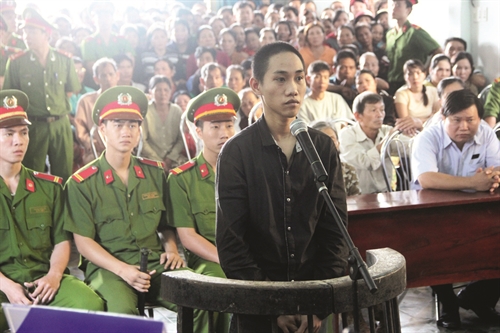 |
| Defendant Nguyen Van Thai is sentenced to death at the hearing for his crimes of murder and plundering property on November 26, 2015, in Ninh Hoa town, Khanh Hoa province __Photo: Tien Minh/VNA |
However, many presented scientific grounds proving that the abolition of the death penalty for these offenses would not affect the effectiveness of crime prevention and handling. For offenders who intentionally inflict harm to victims in order to appropriate property, they would be charged for both plundering property and murder, which carries the death penalty. Regarding those who destroy important national security works, facilities or means, if their offense does not aim to oppose the administration, life imprisonment would be severe enough. In case their acts aim to oppose the administration or cause terror among the population, they would be charged for the offense of sabotaging physical-technical foundations of the Socialist Republic of Vietnam or terrorism, which are both punishable by death.
Technically, the “combined” offenses have been split up to ensure individualized punishment and imposition of more appropriate penalties. For example, of the two new offenses of producing and trading in fake foods, foodstuffs or food additives (Article 193) and producing and trading in fake curative or preventive medicines (Article 194), the death penalty is retained only for the latter. Similarly, stockpiling narcotics (Article 249) and appropriating narcotics (Article 252) are separated from illegally transporting narcotics (Article 250) and illegally trading in narcotics (Article 251) with the death penalty abolished for the offenses in Articles 249 and 252.
Under the principle established in Clause 1, Article 40, capital punishment is a special penalty given only to persons committing particularly serious offenses in the groups of offenses infringing upon the national security and human life and some other particularly serious offenses. As a result, the Code now contains a total of 18 offenses punishable by death, including infringement upon the national security, narcotics-related offenses, embezzlement of state property, bribe taking, terrorism and war crimes[3].
Non-application of the death penalty
Although retaining the death penalty for many offenses, the Code establishes more stringent conditions for imposition of this penalty to ensure individualized punishment and reduce death sentences.
Firstly, regarding the punishment principle, Clause 1, Article 3 of the Code requires severe punishment of conspirators, ring leaders, commanders, die-hard opposers, scoundrels, dangerous recidivists, officials who abuse their positions and powers to commit offenses and persons who commit offenses with treacherous ploys, in an organized and professional manner, with intention to cause serious consequences. Meanwhile, it grants leniency to those who make confessions, surrender themselves, give honest testimonies, denounce accomplices, redeem their faults with achievements, show repentance, voluntarily right themselves or pay compensation for damage they have caused. Accordingly, the death penalty will be handed down only to persons who organize or instigate the commission of offenses, act as active accomplices or cause serious consequences in a number of particularly serious offenses infringing upon the national security, for example: carrying out activities aimed at subverting the people’s administration (Article 109) and rebellion (Article 112). For the offense of undermining peace, crimes against the mankind and war crimes, the death penalty will target mainly at persons who play a decisive role in the crime such as propagating or inciting a war of aggression, or preparing, carrying out or participating in a war of aggression (Article 421); or annihilating en-mass population in an area or destroying the source of their livelihood (Article 422) or giving orders for or directly undertaking, the murder of civilians (Article 423). Other persons who are not accomplices in such offenses will face lighter penalties.
Secondly, the death penalty is applied only in cases involving specially aggravating circumstances, or, in other words, to those committing particularly serious offenses. They include a murderer who murders two or more people, a person aged under 16 or a woman who is known to him/her to be pregnant; a rapist against a person aged under 10 who causes an injury or harm to the victim’s health with an infirmity rate of 61 percent or higher or causes death to the victim or causes the victim to commit suicide; a drug dealer who deals in 5 kilograms of opium resin, cannabis resin or cocoa concentration or 100 grams of heroin, cocaine, methamphetamine, amphetamine, etc.
Thirdly, under Clause 2, Article 40 of the Code some groups of persons are also excluded from the application of the death penalty, including under-18-year offenders, and pregnant women, women nursing children aged under 36 months, and persons who reach full 75 years when committing an offense or being brought to trial.
Non-execution of the death penalty
The goal of reducing death sentences is also exhibited in the Code’s provisions on death-row inmates who will not be executed. These inmates can be divided into the following two groups:
The first group consists of those with special personal identifications. In addition to pregnant women and women nursing children aged under 36 months, Point b, Clause 3 of the Code does not permit the execution of death-row inmates who reach 75 years and entitles them to life imprisonment. On principle, no offenders who reach 75 years when committing an offense or being brought to trial will be sentenced to death.
The second group consists of corruption offenders who actively remedy their offenses and are entitled to special leniency. Under the Code, persons who, after being sentenced to death for embezzlement of state property or taking bribes, voluntarily return at least three quarters of the property embezzled or taken as bribe and actively cooperate with enforcement agencies in detecting, investigating or handling offenses or record great achievements, will have their death sentence commuted to life imprisonment.-
